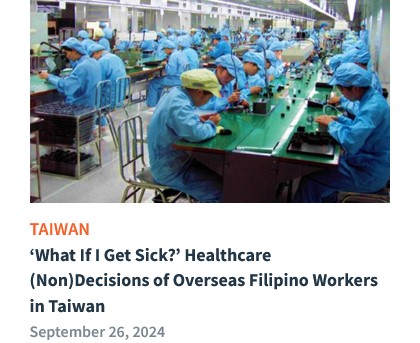
臺大公衛學院為加強宣導本院教師之學術成果,進而提升本院國際能見度,由李柏翰老師之撰寫下列文章投稿至ASPPH Friday Letter.
該文目前已刊登於 ASPPH Friday Letter, September 27, 2024

‘What if I get sick?’ Healthcare (non)decisions of overseas Filipino workers in Taiwan
AUTHOR
Isaiah Christian Felix Antonio ✉️(本院全球衛生學程學生) , 李柏翰 (Po-Han Lee) ✉️(本所專任助理教授)
JOURNAL Social Science & Medicine
PUBLISHED 2024.10.01
ABSTRACT
The increasing presence of overseas Filipino workers (OFWs) in Taiwan, particularly in the electronics and technology (E&T) industry, has raised concerns about their health and health-seeking behaviours. Our study draws on a theoretical framework combining Brandenberger et al.’s 3C model, which considers challenges in communication, continuity of care, and confidence regarding healthcare delivery for migrant workers, with Scott’s sociology of nothing. This framework enables us to interpret the decisions of OFWs on seeking care, not seeking care, or not making any decision. Although the National Health Insurance covers migrant workers and the New South Bound Policy commits to promoting migrant health, narrative accounts of individual workers, migrant rights advocates, and shelter organisers inform us of OFWs’ ambivalence towards utilising the healthcare resources available. The decisions made by OFWs in the E&T industry may include seeking assistance, not seeking assistance, or not addressing health concerns due to legal, financial, or cultural reasons. The contextual nuances behind their decisions led us to look beyond the challenges they face and argue for interventions such as peer education on legal rights awareness and health literacy to enable OFWs to make informed decisions about their well-being.
Highlights
- Documented migrant workers enjoy near-universal health coverage in Taiwan.
- OFWs in the E&T factories face distinctive challenges in seeking healthcare.
- Inadequate communication, care discontinuity, and little confidence in Taiwanese.
- Everyday racism and biased brokers prevent OFWs from making health decisions.
- Peer education on legal rights and health in shelters and NOGs empowers OFWs.
Keywords
3C (Communication; Continuity of care; and Confidence)Health behaviours; Migrant workers; Overseas Filipino workers
